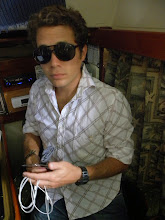After repeated listens, I'd finally gotten around to kind of digging Kurt Vile's previous LP, Childish Prodigy. It took me a while to develop a fondness for the man's musical style, his primitive songwriting.
At that time, I thought I was hearing an artist in transition. Rather than the dead wooden likeness to which many musicians aurally trap themselves, I imagined I was experiencing the organic sounds of an artist about to take a great leap toward his best work yet. The follow up, Smoke Ring for My Halo, was bound to be that next great work.
Upon listening to the album (and I've been through it many times) three things slowly, then very quickly, become clear: 1) Kurt Vile's songwriting technique is based upon, with exceptions, a repeated chord structure (usually finger-picked) in twos and fours before a brief change into unlike, usually ugly, bridging chords that--sometimes too quickly as to be jarring, sometimes too slowly as to be tiresome--lead back into to the primary, repetitive chord sequence (Childish Prodigy was also full of this kind of stuff); 2) Smoke Ring eschews the rock noise of Childish Prodigy for the gentler tones of finger-plucked acoustic guitar, augmented at times by electronic beats and bleeps (all in all, very sonically close to Beck's folk-pop record Sea Change); 3) hopefully, this is not the extent of what Kurt Vile is capable of as an artist. The songs, most of which are pleasant and inoffensive enough, sound less like the efforts of a songwriter than a guitar player (in the folk tradition) trying to write songs, but with limited success.
In "Baby's Arms," the voice that leered to such discomfiting effect on the earlier album is subdued to a quiet pining, contempt and lust replaced with a straining to sound genuinely tender. But Kurt Vile (mostly) knows what works for him, and snarls out (in between the business of sounding soft) "I get sick of just about everyone."
"Jesus Fever," a laid back groover with the familiar refrain of "I'm already gone" also lacks the punch of its predecessor (or the Eagles' early hit of the same chorus), but marries the easygoing singer-songwriter sound of the 70's to the metronome beats of electronic percussion (again, much like Sea Change).
The one bonafide rocker, "Puppet to the Man," most definitively illustrates Kurt Vile's limitations in songwriting. What first presents an interesting idea (tool of the government, though a fairly common theme, is about as complex as we're gonna get on this record) soon goes nowhere--just ridiculous statements independent of one another, laid over the never-ending guitar, a muddy, hardly brilliant noise, incoherence busting out between the overlapping notes. Kurt Vile's lack of interest in following through, the absence of a commitment to any idea except not wanting to talk to anyone and just stay where he is is frustrating, and perhaps says more about people who listen to modern rock records today than I would like to admit.
The weariness of "On Tour," on the other hand, seems perfectly authentic. Here, Kurt Vile seems to know what he's talking about: the struggle to connect with anyone in a meaningful way. In Kurt Vile's world, only a select view exist who do not want to destroy you, or hurt you, or waste your time. In this song there is the ring of truth without the ineptness of the preceding track.
Like "Puppet to the Man," though, "Society Is My Friend" puts onto display an artist out of his depth, lacking any ability to express the complexities of the positions he sets forth ( the same could be said of Wilco and Arcade Fire). Similarly, John Lennon could be found guilty of oversimplifying a complicated idea into a slogan song ("All You Need Is Love," "Give Peace a Chance"); however, Lennon, no matter what his faults, encouraged togetherness and equality, while Kurt Vile's vision is much more inward and bleak. His mistrust of everyone leads to a musical and lyrical stasis that perpetuates itself in every song he performs. "Society is my friend / It makes me want to lie down in a cold bloodbath" is just stupid, the misanthropic attitude of a teenager.
The last several songs reinforce what's happening in the first half of the album. "Runner Ups," though steeped in the same toxic honey water as "Baby's Arms," foregoes attempted tenderness and doubles down on detached distaste; in "Peeping Tom," a pretty, repeated guitar figure isn't enough to elevate the music from entropy and lyrical inanity; "In My Time" is the pop hit of the record, with echoes of the Replacements in the chorus; the title track, which could be the record's best or worst song (I was unable to tell after a while) suffers from the same production style and arrangements of the the others before it, and is buried amongst the bloodlessness; and, finally, "Ghost Town" could be the thesis of the entire works: "I think I'll never leave my couch again."
Kurt Vile's Smoke Ring for My Halo is something you can listen to, but is it worth the time? It seems most appropriate as a soundtrack to those times when reality appears as a stoned disconnect, in which the artist's sentiments are suitable. The final song and the most memorable is an instrumental entitled "(shell blue)." Its spookiness would fit as the main theme for a dark HBO drama or the background to a scene in a movie, where heavy shit is happening in slow motion.
Thursday, March 29, 2012
Subscribe to:
Post Comments (Atom)

No comments:
Post a Comment